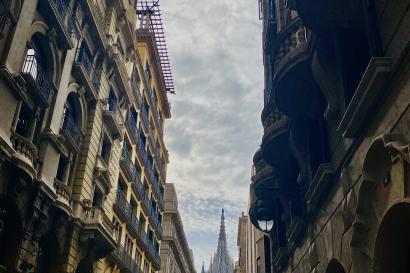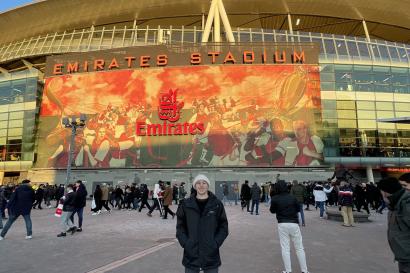
(One of my class assignments, for Maire Doyle’s immersion writing class, gave me the chance to interview anyone of my choice and write about the interview. I think it’s important as an LGBTQIA+ person to learn about that community in a new place, when one goes there, and I wish I had started earlier. So I’m posting this as one starting point for any future students interested in that! The LGBTQIA+ community may feel small in Ireland, but it’s there for those who want to reach out, and there are multiple resources and organizations.)
The primary transgender advocacy organization in Dublin is understandably busy, and it took a couple weeks for me to schedule an interview. They provide numerous resources, from support groups to political action. When I eventually spoke to Alexandra, an intern at TENI, she was friendly and knowledgeable, with a lot to say about how things are for trans people in Dublin and in Ireland as a whole.
I called in the afternoon, from an empty IES Abroad classroom. It was my first conversation with another trans person in Dublin besides my friends from back home. The default anxiety of phone calls as replaced by a sense of relief when I was put through from reception to talk to Alexandra, who greeted me by name.
“How accepting do you think Ireland is, compared to other places, and also do you think it varies depending on where you are in ireland?”
Her reply was nuanced. “Yeah no I would say it absolutely varies, depending on the place, and Dublin and kind of more kind of cosmopolitan areas, y’know, more cities, would be more accepting of trans people. Because there tends to be more of a trans population in those places. It’s become more of a normalized thing to see trans people in their daily lives. Whereas I think down the country, the tendency is for a lot of people to think that they’re not really welcome to be who they want to be, so they kind of hide themselves away, y’know?”
That echoed what I’ve seen in other places, and the way I and the other trans people I know tend to flock together in urban areas.
She continued, “So i would definitely say that, it’s easier to be yourself and also kind of slip into anonymity, as well, in a city, as well, cause it’s so big. Where smaller communities in rural Ireland would kind of know each other’s business and they don’t necessarily want everyone to know that you’re trans.”
Wondering how the tendency to gather (and the social life) might work out here, I asked, “In your personal experience, is there a pretty broad trans community at least in Dublin? A pretty good, supportive community?”
“Yeah,” was the slightly ambivalent-sounding response. “Definitely a kind of broad, spectrum of people with different identities in Dublin. Again, I think because of, there’s so much community in places like Dublin, or Cork, or Galway, and a lot of the work tends to be in cities as well, so a lot of trans people would flock to cities, because, one, they know there’s probably a higher chance that they can get work, and two, because they probably know that there’s a much better sense of community in these places than there is down the countryside.”
“In terms of problems affecting trans people in Ireland, are there any things that really stand out, as problems that need to be addressed?”
“I would say the main thing that faces trans people is still the medical end of things. Medical transition is - it’s really expensive, obviously. I would also say that an issue is there’s a lot of gatekeeping in the HSE [Health Service Executive, Ireland’s national health agency]. There’s a lot of - there’s a lot of people doing good work and trying to help trans people, and I don’t want to discredit them, but at the same time I think there’s also people who aren’t serving trans people’s best interests. And want to go through this very specific procedure when sometimes you’re dealing with people who really need access to medical care to, y’know, help with their mental health issues, or, their body issues as well. So I think medical transition is probably the biggest hurdle that trans people face.
The other thing that i would say is probably sort of, casual transphobia, and transphobic sort of attacks, and hate crimes, as well. Trans people, because the media culture that still exists sort of - here and in the UK - kind of demonizes trans people to a certain extent, or at least in certain parts of the media. I think that trans people are kind of othered and treated as if they’re not really human beings and they don’t really deserve respect.
So you get a lot of people kind of coming up - that might attack trans people, shout like a slur at them as they walk past, or who feel that they can sort of victimize trans people because society has - mainstream society has sort of deemed that trans people don’t deserve respect when obviously that’s not the case at all.”
I remarked that it sounds a lot like the US in that way.
“Yeah. I mean, it’s definitely better than it was, I don’t want to paint a completely bleak picture, because there are plenty of people who are mostly supportive - I mean, I can speak as a trans woman, from my own experience, that when I go out presenting in a feminine dress sense or even an androgynous dress sense, I do worry about people saying things to me or that someone might try to physically or verbally abuse me. So that culture definitely does exist in Ireland, it’s just trying to stamp that out and kind of stop it, y’know?”
“Are there any ways that you think people could be doing more to kind of, help with that, and to increase people’s safety and get rid of that culture of transphobia?”
“Yeah no absolutely. I think a really important thing to bear in mind is that - I think we, lots of people kind of joke about how ‘the cis are awful’ and that sort of thing,” she said, referencing a common inside joke used to vent frustration with transphobia. (It seems to be an international joke for an international problem.) “I think we do need cis allies to stand - we need people to stand up for us and help us. If somebody sees a trans person , they’re maybe being cornered by a group of people, or a trans person, like, the public needs to kind of take the initiative and step in, particularly if they’re like older, may come across as slightly more intimidating to these aggressors.”
I think as well, to get rid of this kind of culture of transphobia it’s about people accepting trans people. As much as I don’t want trans people or LGBT culture to kind of become sterilized, or ever like, too safe, I think that trans people still have to exist in the world and we still have to work, and we still have to live our lives regardless of how we identify, and I think it’s just a case of, y’know, employers, schools, public offices creating an environment that trans people know that they’re safe in, that they’re welcome in, and that they’re valued in.
And I think that would go a long way towards kind of tackling casual transphobia, because not only would it be a massive step forward for kind of showing trans people that they are just as valued as anyone else, but I think it would also cut down on a lot of the casual transphobia, or sort of, horrible remarks that can be made, whether intentional or not, by people in the workplace or people in the school that usually kind of stem from ignorance or - something else. It’s kind of, I’d say those are kind of the two main things that I would say we need to do.
I mean, this goes across the board, it’s not just to do with trans people. It’s to do with, you see someone targeting a racial minority, in public, like, try and step in if you can determine that it’s safe for you or you and other people to step in and defend that person, or try and like ward off these kind of aggressors. And I think that goes a long way, because if the aggressors see that this won’t fly, that this won’t be something that they can kind of get away with without consequence, then hopefully that stops the problem. Or at least greatly reduces the risk to a trans person, or a person from a racial minority, or someone who, y’know, maybe like has physical or mental disabilities, that sort of thing. I think in general it’s important to try and put yourself out there and help when you see any sort of injustice, that you are motivated to step in and try to stop it.
Then obviously the second thing is just, try and create a welcoming environment, because the more that trans people feel like they’re part of the wider world, the better it is for everyone involved.”
Both for my own concerns and because the same issues may come up for other trans new arrivals in Dublin, I asked something that I wish I had looked into more at the start of the semester. “If one were, say, a trans person or other marginalized person who, say, had just moved to Dublin - if someone had no prior knowledge of - what would you recommend, if anything, for finding community and living safely as a trans person?”
“I would say, probably I would say if you’re a young person look up local LGBT groups, or specifically trans groups. In the case of a marginalized person, any sort of situation, look up local community groups, that’s a sort of massive sort of step forward. And while it’s not the easiest thing to do, I think it’s a good way to connect with people, it’s a good way to meet people, and it can help somebody who’s arrived here from feeling that little bit less alone.
I would also look for organizations as well - obviously with trans people, TENI, also do a lot with trans young people. So I think, y’know, find your local community. We don’t exist in a bubble, we’re out here and we would like to be welcoming and open to new people, to help them in any way we can. So I would definitely say, seek out community, seek out local organizations if you can’t find those communities. Because the organizations will always have sort of a finger on the pulse and be able to direct you towards those communities where you might fit in.”
That’s advice that I think could help any new arrivals; you don’t have to wait for people and experiences to find you first.
“Also in terms of resources, also because i’m interested in comparing Dublin a bit to the US. In terms of resources like, legally trying to do something about discrimination like employment discrimination, or like getting law enforcement involved in the case of harassment or hate crimes or something like that - I know in the US a lot of people are sort of reluctant to do that, to involve the police in any way, because, we’re afraid of them, to be quite honest -” I interrupted my own sentence with a laugh, thinking of my own possibly over-careful hesitancy even when followed by a car or seeing someone’s foot through my skylight at two in the morning. (The former, though, had been partly at a friend’s suggestion, because none of us wanted to see how Jersey City cops would react to a trans woman and two nonbinary college students out at night.)
Alexandra laughed too. “understandably so, yes, with the police in the States today.”
“Yeah.”
“Yeah, I can understand that.”
Would you say it’s anything like that in Dublin, or is it a little bit better, or - ?”
“Em, it’s kind of tough to say, to be honest. I think there’s a tendency with marginalized communities anyway, to not - Well, as I can see, across the board, in my experience, marginalized people don’t want to really go to the police a lot of the time, for crimes or anything like that, that may have happened against them. Or, I mean I know that [seeking recourse for] workplace discrimination is a bit more commonplace, generally because people trust that they’ll be a bit more transparent, with their employers, than with the police, in a group like that.
Y’know, em… I’m trying to think, really - I think that, y’know, it’s a difficult question. I think there are some people that would absolutely contact the police, if they were robbed or they were the victim of a hate crime. But I think it’s really difficult to tell, because I’ve heard so many stories that people were being assaulted, or, like I said someone breaking into their house and they just - they’re so fed up with dealing with the police, or with any organization like that, they don’t bother because they know, say that it’s a nonbinary person that they’ll be misgendered, or that they won’t be treated with respect. That they should be, y’know, entitled to. And likewise, with binary trans people as well.
I think, in most cases, it’s a lot like the US. I think most marginalized people will just not deal with the police, because their lives - as difficult as a crime may have been, dealing with the police sometimes is just more infuriating than anything else.
I think there’s definitely a cultural shift to try and make the Gardai more transparent and more cooperative with the LGBT community in Dublin and sort of across Ireland. But y’know, I think it’s kind of too early - and I’m talking like kind of in the last couple of months, so I think it’s a case of maybe looking at this in a year, two years, three years, and has that actually improved, y’know, has there been an uptick in reports of LGBT hate crimes.”
(I think it says a lot that an uptick in reports can be a good sign, rather than the opposite, because as things stand the lack of faith in authorities helping is that strong in many places.)
“Or y’know, crimes involving marginalized people, has that increased, or are people still afraid to kind of go to these bodies and ask for help.”
I realized then how much information I’d been asking for - it had been almost twenty minutes. “That makes sense. And I don’t want to take too much of your time but - “
“No! No not at all, I’m happy to help honestly,” Alexandra protested.
“I guess, to ask a more general question, is there anything in terms of trans life in Dublin and Ireland, specifically, you think that people in other countries might not be aware of that maybe they should be, or like, something that you think that is a common misconception or anything like that?”
In terms of trans life in… Ireland… is that what you said?
I had spoken clumsily, and did my best to clarify; she made the best of my vague phrasing.
“Yeah, yeah I would say that we - I think all of the kind of international coverage of sort of marriage equality and the gender recognition bill that came out in 2015 - I think something that’s not really being spoken about internationally, is that the current gender recognition bill does not formally recognize nonbinary people in Ireland. Nonbinary people do not have the facilities to change - to alter their birth certificate, the Irish government does not recognize them. Like - I’m trying to remember but I think Canada introduced the third gender option? I think it is.”
(Canada has, I would confirm later, made “X” an option for gender on passports.)
[mhm]
“So there is no formal recognition of nonbinary people at the moment, and that’s a massive mistake. I think that’s something that people internationally would probably have thought was covered by the gender recognition legislation. But it isn’t. It’s going to be in the updated version of the bill, but like I said I think there was so much talk at the time like, ‘Ireland’s so progressive,’ this sort of very Catholic country is, y’know, all of a sudden the LGBT rights are so progressive! And I think in that kind of flurry of excitement, a lot of the international news media didn’t really examine the fact that with these laws being brought in that while they are incredibly progressive, that they have their downsides, that they have their faults. They needed to be - we weren’t quite where we needed to be for LGBT protection yet. Although it was a massive step forward.”
It was refreshing to hear the idea of those options for people like myself phrased as an expectation rather than a pipe dream, even if I’m not sure I would pursue it myself for safety reasons. “I hadn’t even thought of that, I sometimes forget that legal recognition of that is an option, speaking as a nonbinary person… I’m glad it’s being considered, though, and I think that’s definitely important.”
“Oh it’s so important. And potentially you’re talking about, like, half the people in the community aren’t being recognized as who they are. And it’s really crummy because like, binary people got that privilege two years ago. And that is fantastic, it’s great, trans people have been waiting - or, binary people at least have been waiting seven years for that to come through, because the government kept sort of saying that this was an issue that they were going to deal with - that they kind of kept putting it off? It wasn’t really something that they were ever sort of - rushed for them? It wasn’t the main topic on their minds, I’ll say that much.
But now, we need nonbinary people to get that same recognition, and to be recognized for who they are in our country, y’know. I think that’s absolutely a battle that should be won, if we want to be that sort of progressive image that the international media put ahead of us.”
It had been over twenty minutes, and regretfully I needed to get to class. We wished each other a good day, and I thought about how there was more community, and possibilities for real social progression, around me than I’d realized. I would definitely seek more involvement if I returned to Dublin. But even if I don’t, talking to another trans person outside my home country chipped away some isolation and cynicism I hadn’t been very aware of.

Miranda Stewart
<p>I am a senior at Sarah Lawrence College, studying ecology and communications. I’ve studied writing, story art, and animation, and I’m also interested in using what I’ve learned from that for other forms of storytelling like documentary film. I really like plants, weird fungi, and cats. I also like learning new things about the world; I like having the opportunity to ask questions and hope for unexpected answers.</p>








